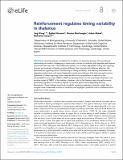Reinforcement regulates timing variability in thalamus
Author(s)
Wang, Jing; Hosseini, Eghbal; Meirhaeghe, Nicolas; Akkad, Adam; Jazayeri, Mehrdad
DownloadPublished version (7.016Mb)
Publisher with Creative Commons License
Publisher with Creative Commons License
Creative Commons Attribution
Terms of use
Metadata
Show full item recordAbstract
© Wang et al. Learning reduces variability but variability can facilitate learning. This paradoxical relationship has made it challenging to tease apart sources of variability that degrade performance from those that improve it. We tackled this question in a context-dependent timing task requiring humans and monkeys to flexibly produce different time intervals with different effectors. We identified two opposing factors contributing to timing variability: Slow memory fluctuation that degrades performance and reward-dependent exploratory behavior that improves performance. Signatures of these opposing factors were evident across populations of neurons in the dorsomedial frontal cortex (DMFC), DMFC-projecting neurons in the ventrolateral thalamus, and putative target of DMFC in the caudate. However, only in the thalamus were the performanceoptimizing regulation of variability aligned to the slow performance-degrading memory fluctuations. These findings reveal how variability caused by exploratory behavior might help to mitigate other undesirable sources of variability and highlight a potential role for thalamocortical projections in this process.
Date issued
2020Department
Massachusetts Institute of Technology. Department of Brain and Cognitive Sciences; McGovern Institute for Brain Research at MIT; Harvard University--MIT Division of Health Sciences and TechnologyJournal
eLife
Publisher
eLife Sciences Publications, Ltd